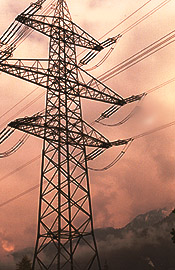New electric energy model
On July 21, Brazil's Ministry of Mines and Energy released the draft guidelines of a new regulatory framework for the Electric Energy Sector. The draft proposes substantial changes to the current set of rules implemented by ex-president Fernando Henrique Cardoso's government during recent privatizations.
quarta-feira, 20 de agosto de 2003
Atualizado às 07:05
Draft model of a new regulatory framework for the brazilian electric energy sector
Felipe Eluf Creazzo
Lira Renardini Padovan*
 On July 21, Brazil's Ministry of Mines and Energy released the draft guidelines of a new regulatory framework for the Electric Energy Sector. The draft proposes substantial changes to the current set of rules implemented by ex-president Fernando Henrique Cardoso's government during recent privatizations.
On July 21, Brazil's Ministry of Mines and Energy released the draft guidelines of a new regulatory framework for the Electric Energy Sector. The draft proposes substantial changes to the current set of rules implemented by ex-president Fernando Henrique Cardoso's government during recent privatizations.
The new model is scheduled to take effect on January 1, 2004, although political analysts do not expect the draft to be converted into law before that date due to the large number of bills currently pending in the Brazilian Congress. Therefore, the model may be enforced initially through the issuance of a Provisional Measure ("Medida Provisória"), a temporary executive act on urgent matters which generally is later converted into law.
The reasons underlying this proposal were of no surprise to the electricity sector: distribution companies have been facing serious economic crises for the past three years, with pre-bankruptcy situations being increasingly common. Moreover, with almost complete investor uncertainty as to expected revenues and returns, investments in the electric energy sector have stagnated. Finally, power shortages and tariff increases have adversely impacted the country's economy, affecting mainly low-income population.
The new model introduces stricter regulations on the aspect of government supervision and control, and is aimed to keep short-term capital at bay and to attract to the sector only leading long-term players. Minister Dilma Rousseff recently justified the new measure on the grounds that the following goals should be urgently achieved: (i) assurance of continuous supply, (ii) lower tariffs, (iii) increased quality of services, (iv) just return to investors as an incentive to service expansion, and (v) universalization of access.
The draft is only the first step of a broader reform. The Ministry has already stated its intention to gradually release guidelines on the transition procedures and, most importantly, the legal and institutional aspects associated with the new model.
The Structure of the New Model
The draft does not modify the current system's organization, encompassing generation, transmission, distribution and energy trading (or commercialization). Instead, it reforms the government's functions and regulated market practices that are currently in place, especially within the generation and distribution segments.
Among many other innovations, the model's key structural changes include:
-
The Ministry's re-acquisition of powers to grant licenses and implement electricity policies, which are currently responsibilities conferred to the National Electric Energy Agency ("Agência Nacional de Energia Elétrica" - ANEEL). ANEEL would then be limited to regulating and supervising the electricity system.
-
The establishment of two different electric energy commercial environments: (i) the so-called "Pool", a strictly regulated environment in which all generation and distribution concession holders participate and in which all electric energy contracts are supervised and liquidated by a new Ministry-affiliated entity (as defined below), and (ii) the Free Trade Environment ("Ambiente Livre de Contratação" - ALC), where Free Consumers (consumers with a demand of 3 MW or greater), energy traders, Independent Power Producers ("Produtores Independentes de Energia" - IPPs) and thermoelectric companies will freely agree on contractual terms for purchases and sales of electric energy.
-
The creation of the Electric Energy Agreements Manager ("Administrador dos Contratos de Energia Elétrica" - ACEE), the Ministry-affiliated entity that will supervise, register and liquidate the contracts mentioned above which are transacted in the Pool. ACEE will only register and liquidate contracts in the ALC and will supersede in all organizational and operational functions the soon-to-be extinct MAE ("Mercado Atacadista de Energia"), the current official wholesale electric energy market coordinator.
-
The creation of the Energy Studies and Planning Foundation ("Fundação de Estudos e Planejamento Energético" - FEPE), a Ministry-affiliated research and planning entity whose main goal will be preparing and submitting for public hearings a 20-year plan for the sector, which will be subject to review every 4 years, and a 10-year plan, which will be subject to review annually.
-
The creation of the Ministry-affiliated Electric System Monitoring Committee ("Comitê de Monitoramento do Setor Elétrico" - CMSE), which will monitor service conditions for purposes of ensuring continuous energy supply.
The Pool
The Pool is proposed to be the electric energy trading environment in which all energy produced by generation companies will be commercialized with distribution companies - the only exception being the electric energy produced by the Itaipú Power Plant, which was excluded from the Pool and that will continue to be commercialized by Eletrobrás, the federal government's energy holding company. In the Pool, each generation company will be required to contract with all distributors for the supply of energy and each distributor will contract with every generation company for its projected 5-year energy demand, which must be accurately estimated and reported to FEPE. This system relies on the assumption that because the energy supplied to a small distributor will derive from the same source as the energy supplied to a large distributor, benefits created by cheap generation will eventually reach consumers. The distributors' obligation to forecast their demand was criticized by industry representatives but justified by the Ministry on the grounds that it will provide a reliable source of information to assess the country's need for new power projects.
While all current concession holders are required to take part in the Pool, independent power producers (IPPs, which in Brazil are mostly small hydroelectric plants) and thermoelectric companies may do so, at their own option. That is, IPPs and thermoelectric companies may be integrated with both the Pool and the Free Trade Environment, on a non-exclusive basis, the only difference being that they will observe the Pool's rules with respect to any transactions executed in the Pool and will perform at their own risk while in the Free Trade Environment. Sector analysts believe that the inclusion of thermoelectric companies in the Pool will guarantee the thermoelectric sector some market share, and that it will also benefit Petrobrás, which is the main investor in the Brazilian thermoelectric industry.
Contracts for the purchase and sale of energy executed in the Pool will follow mandatory public bid procedures carried out by the Ministry. These contracts will cover long-term supplies, which, according to the Ministry, will assure a stable flow of returns to investors and contribute to the financing of expansion works.
The purchase and sale of energy in the Pool will proceed as follows: each generation company, including IPPs and thermoelectric companies that choose to take part in the Pool, will execute a Generation Services Agreement ("Contrato de Prestação de Serviços de Geração" - CPSG) with ACEE. Similarly, each distributor will execute an Agreement for the Use of the Generation System ("Contrato de Utilização do Sistema de Geração" - CUSG) with both ACEE and the generation companies (including IPPs, thermoelectric companies and industrial plants that generate energy for their own consumption). Distributors will be required to present guarantees for their payment obligations, which will be backed by their receivables.
Tariffs will be strictly regulated in the Pool. They will be calculated by ACEE and approved by ANEEL. As a general rule, the goal will be to have the same tariffs across the country and, to achieve that goal, mechanisms to ensure economic equivalency of tariff adjustments on all distribution companies will be implemented in a timely manner.
Free Trade Environment
The Free Trade Environment's participants will be the Free Consumers, energy traders and IPPs and thermoelectric companies that choose to remain outside the Pool. As previously noted, ACEE will be in charge of registering and liquidating the agreements executed in this environment only for settlement and accounting purposes. IPPs will sell energy in the Free Trade Environment to (i) Free Consumers, (ii) energy traders that service Free Consumers, and (iii) industrial or commercial facilities to which they also provide steam on a co-generation basis. As previously noted, IPPs also will have the option of selling energy in the Pool to distribution companies, in which case they will be subject to the Pool's rules.
Public Bid Procedures and Agreements
Bid procedures will be carried out for (i) the development of new projects, and (ii) the purchase by distributors of their projected energy demand. For new project developments, the winning bid will be the one offering the smallest budget and for the purchase of projected energy demand the winning bid will be the one offering the lowest distribution cost - what will ultimately represent lower consumer tariffs. The current system is mostly based on the highest price offered for the project concession.
The agreements resulting from these bid procedures will be (i) concession agreements, in case of hydroelectric plants (except for the small hydroelectric plants classified as "Pequenas Centrais Hidrelétricas" - PCH), and (ii) authorizations, for all other cases. As a general rule, concession agreements in the sector observe the so-called "public law regime," meaning that principles of Brazilian Public Law (such as transparency, universalization, quality and expansion, among others) apply and are enforced by ANEEL and the Ministry. Authorizations are also generally regulated by these government entities, but are performed under "private law regime" and are not subject to most public law principles applicable to concessions.
For purposes of preserving their economic-financial ratios, all agreements will be revised every 5 years (economic indices used for adjustments are still to be indicated). The term of a power plant concession agreement will be consistent with its corresponding cost amortization and will not exceed 35 years. Upon expiration of an agreement covering a hydroelectric development, the project will be put up for public bid, for a 15-year term agreement. The price to be paid for such project will be limited as to compensate the investor solely for its operational and maintenance costs.
Transmission
The model will not introduce major changes to the transmission segment, except for two modifications: (i) assets belonging to low tension transmission lines will be transferred to distribution companies, and (ii) isolated systems, the transmission systems outside the integrated system (the transmission lines network connecting generation and distribution companies across Brazil) will be gradually interconnected with the integrated system. FEPE will be in charge of preparing feasibility studies and mechanisms to implement these changes.
Distribution Companies
Distribution companies will be able to supply energy only to captive consumers and prevented from dealing with Free Consumers (except for network access services). Their commercial transactions will be restricted to the Pool, where they will purchase energy from generation companies for their projected 5-year demand, upon placement of a payment guarantee backed by their receivables. They will present their 5-year demand forecast to FEPE and, except for inaccuracies due to systemic fluctuations, will be imposed penalties for any inaccurate forecasts.
Distributors will purchase from generators on a regular basis the following categories of energy: (a) "regular energy," an amount equal to their mandatory 5-year forecast provided to FEPE, and (b) "reserve energy," an amount determined by the Ministry. Also, distributors will occasionally be obliged to purchase the following categories of energy: (i) "additional energy," an amount determined by FEPE, which cost will be reflected in consumer tariffs, and (ii) "extraordinary energy," an amount determined by the Ministry, which costs will be reflected in consumer tariffs only in case of system fluctuations.
Distributors will be separated from any generation and transmission activities that they may hold and will be required to provide their services exclusively to captive consumers. On the other hand, it will be possible to maintain generation and transmission activities vertically integrated.
In order to concentrate in the Pool all the energy traded between generation companies and distributors, distributors will no longer be allowed to generate part of their distribution energy demand. Upon termination of concession agreements held by distributors engaged in generation, the power plants they have been granted under such regime will be put up for public bid. Current concession agreements allowing generation by distributors will be changed immediately upon the new model's effective date to split the distribution and generation activities into separate companies.
Free and Captive Consumers
Free Consumers will be able to buy energy from (i) IPPs, (ii) energy traders or (iii) industrial plants that generate energy for their own consumption with excess energy. If Free Consumers buy energy from local distribution companies, they will be regarded as captive consumers for all regulatory purposes.
Free Consumers will be required to give 5-year notices in order to become captive consumers, the same rule generally applying to captive consumers willing to become Free Consumers (in this case, 2-year notices may apply when involving renewable energy sources). Both Free Consumers and captive consumers will bear the costs of the so-called energy reserve, which is an amount of energy required to be contracted in order to cover possible errors in the distributors' demand forecasts.
Conclusion
The draft model envisions a very significant revision of the regulatory framework for the electricity sector. Market practices associated with generation and distribution activities will soon be tied to schedules and forecasts designed by both the Ministry and the private investors themselves. The model intends to make revenues and tariffs more stable and less exposed to market fluctuations.
The transition from the old to the new model, however, will not be an easy task. Current contracts contemplate higher risks and market oscillations, elements that are expected to be mitigated under the new model. Thus, new guidelines on the transition period are anxiously expected by the sector, and should soon be released by the Ministry.
Although the generation segment is regarded as the one to benefit most from the new model, given that distributors will be tied to long-term energy purchase agreements and will be required to provide payment guarantees, the whole sector may experience a positive turn towards less risk and more stable returns.
_______________
* Attorney at Curtis, Mallet-Prevost, Colt & Mosle LLP and Araújo & Policastro respectively.
_______________________





